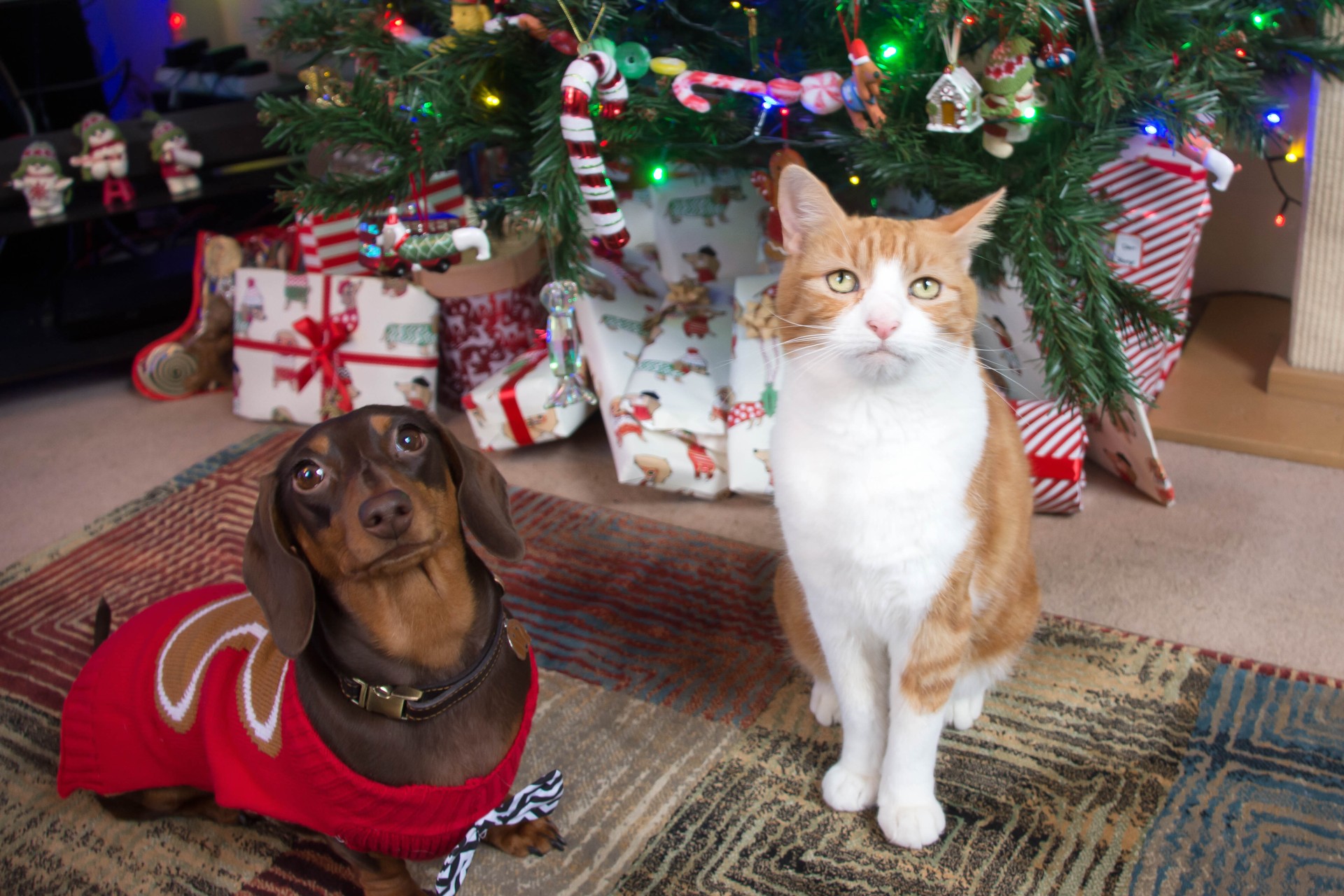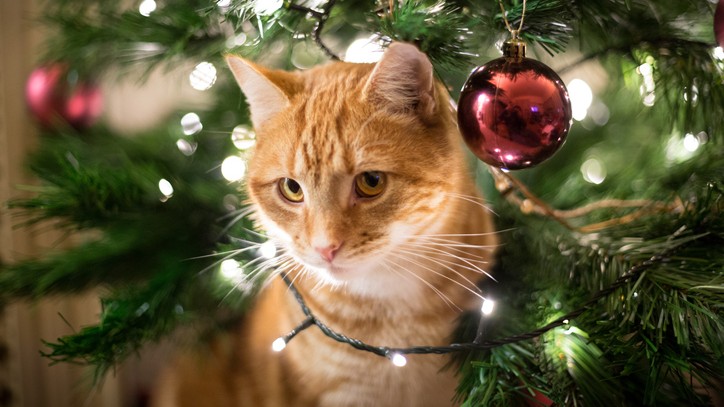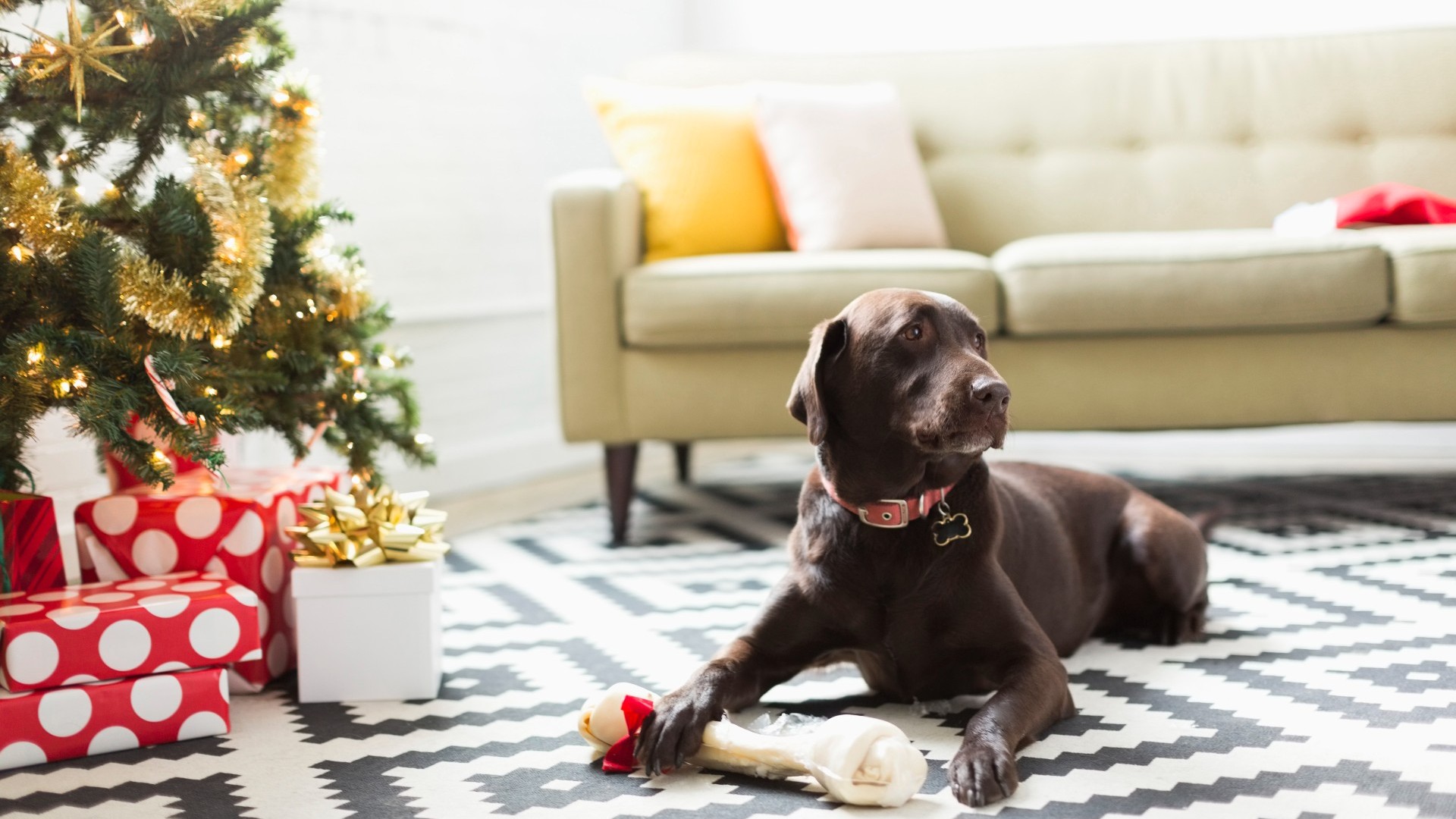
It's the time of year to wonder if Christmas trees are toxic to cats and dogs. You're decorating for the holidays and want to make sure your pet is safe - we totally understand. Cats and dogs tolerate plants differently, but we'll cover both pets and how they react to different types of Christmas trees, whether they're natural or artificial.
Cats and dogs are often drawn to the shiny, smelly, bright new additions to your home, so it's common for owners to wonder if Christmas trees are toxic. Cats may jump up and knock baubles off, dogs may whack some ornaments off with their tail, and both may try to take a bite out of the tree itself.
This article will cover why pets are drawn to Christmas trees, if Christmas trees are toxic to cats and dogs, and how to make sure your Christmas tree is safe for pets.
Why do pets like Christmas trees?
Cats and dogs do seem to be drawn to Christmas trees, and there's a few reasons why. For cats, a Christmas tree presents a new perch up high and a new place to hide, as well as offering up a ton of potential new toys whether it's baubles in the shape of balls, glittery tinsel, or dangling ribbon.
The Christmas tree also acts as a place of shelter and comfort, which may be why cats love to lay at its base. Many of the reasons why a cat is drawn to a Christmas tree is also why a Christmas tree can be dangerous for them.
For dogs, Christmas trees can seem like shiny new toys. Puppies are especially drawn to them, as they may want to chew the branches, pull of decorations, or tip the whole thing over. All of these things can present a danger to your dog.
Are Christmas trees toxic to cats?

Live Christmas are often fir or pine trees, and while these are mildly toxic to cats and cause gastrointestinal upset, it's the needles themselves that can also harm them. There's a small risk ingested fir or pine needles can cause internal damage, and they can also hurt your cats eyes or ears if they come in contact with them.
The fertilizers and plant food you'll find the in the base of live Christmas trees can be highly poisonous to your cat, so if you've bought a pre-potted live tree you'll want to swap the soil out before bringing it into your home and make sure anything you add to your tree's base is cat-safe. Potted tree bases can also pose another problem: cats may think it's a new litter box.
Are Christmas trees poisonous to dogs?

Natural Christmas trees, which are commonly just a type of fir or pine tree, are considered mildly toxic to dogs, according to pet care company Hartz in a Newsweek interview. The oils from the fir or pine trees and the tree needles themselves can upset a dog's stomach, with the oils causing excessive vomiting and drooling and the needles posing a potential risk to puncture the intestinal lining.
But what is even more dangerous for dogs is the tree's water. Live Christmas trees need a base full of water, which dogs ca mistake for a bowl. There are often preservatives in the water supply that can poison your dog.
What type of Christmas tree is safe for pets?
Artificial Christmas trees aren't toxic to dogs or cats so they are technically safer than live Christmas trees, but they can still be dangerous. Artificial needles can still fall off of the tree and pose a threat to your pet if ingested, however they are considered much safer than real trees overall. If you're in doubt and want to be extra-careful this holiday season, go fake.
How to make your Christmas tree safe for pets
There are several ways to ensure your Christmas tree is safely set up for your cat or dog. Let's take you through the checklist you should have on hand this holiday season.
1. Get a quality tree stand
A sturdy base will help prevent your cat or dog from knocking over your tree, which would send baubles and needles everywhere. A heavy, high-quality stand will help anchor your tree to the ground - you can even loop fishing line to the top of the tree and anchor it to a s crew in the ceiling. This means it won't tip over if your cat tries to jump into it.
2. Wait to decorate
Let your cat or dog get used to the new addition to the house before decorating the tree. If they do knock it over while they're figuring it out, it'll cause less of a mess, and hopefully they'll be less interested in it when you do finally decorate it with ornaments and lights.
3. Figure out a Christmas tree "alarm"
If you want to make sure you know whenever your pet is sniffing around the Christmas tree, put tin foil around the base. You'll hear a dog or cat walking around near it, and there's an added bonus: cats don't really like the feeling of tinfoil on their claws, so they'll probably avoid it all costs.
4. Put glass/breakable ornaments higher up
Dog tails and cat claws can easily knock down fragile ornaments, especially older glass ones. Broken ornaments can be especially dangerous to your pets - and you as well, so you want to make sure it's almost impossible for them to break.
Place fragile ornaments higher up on the tree so they're less likely to get interfered with by your furry friend. Or, forgo the breakable ornaments and switch to plastic baubles. You can also keep the bottom branches of your tree empty to help ensure no ornaments are knocked off.
4. Leave lights off the bottom branches
Pets can get tangled up in strings of lights or may even chew on them, as they can be extra hard to resist for cats and dogs due to their brightness. Keep strings of lights off of the bottom branches to help avoid any tangling incidents, and also be careful how you plug the tree in by ensuring cords aren't stretched over highly trafficked areas. You can also cover them with a tree skirt or use cord clips to keep them safely out of reach.
5. Avoid candy ornaments
Many people hang candy canes or chocolate decorations on their Christmas tree, but these are toxic tot your pets! Avoid them all together, and save them as a treat for the humans on Christmas day.
PetsRadar Newsletter
Get the best advice, tips and top tech for your beloved Pets
PetsRadar is a website dedicated to providing expert advice for happier pets. Whether you're a parent to a dog, cat, reptile, horse or rabbit, PetsRadar offers a pathway to healthier pets and happier owners through our unique combination of trusted advice, expert guides and in-depth reviews.

